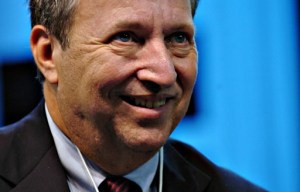 Andreessen Horowitz is announcing today that economist, former US Treasury Secretary and former President of Harvard Larry Summers is joining the firm as a special advisor.
Andreessen Horowitz is announcing today that economist, former US Treasury Secretary and former President of Harvard Larry Summers is joining the firm as a special advisor.
Beyond his well known academic and political credentials, Marc Andreessen was quick to point out that Summers has nerd cred too: He was admitted at MIT at the age of 16 to study physics.
Summers will be part time, acting in an advisory role exclusive to the firm. Specifically, he’ll be helping startups think through economic and pricing models as they strive to disrupt large industries, not only in the United States but in the turbulent and ever-changing global economy.
Although Andreessen Horowitz is one of the only big name Silicon Valley firms not investing in emerging markets directly, all of its companies are seeking to tap into them and many like Jawbone, ShoeDazzle and Lytro are made possible by the flattened, global economy.
The inspiration for the role comes from Hal Varian, a top economist who played a pivotal role in helping Google rethink the ad market, laying the foundation for several of the key algorithms that went into the paid search model, Andreessen says.
Not surprisingly, the conduit for Summers and Andreessen’s relationship was Facebook COO Sheryl Sandberg, an early protege of Summers at Harvard who also worked with him at the World Bank and the Treasury. Andreessen is on Facebook’s board, and several months ago Sandberg insisted the two meet. As a side note, Sandberg is only the second person I’ve ever heard Andreessen describe as “a human router”– the first being, you guessed it, Ron Conway.
The big question is whether this is just one of those glitzy big name announcements venture firms like to make that we never hear about again– ala Bono, Al Gore, and Colin Powell — or whether Larry Summers will actually make a meaningful impact on Andreessen Horowitz’s portfolio companies. “I’m not sure what has gone well or not at other firms, but I know what we’re going to do and several of our entrepreneurs have already starting meeting with him,” Andreessen says.
According to Summers, the firm isn’t being shy with requests. “I go to bed most nights with emails from Marc and wake up most mornings with more emails from Marc,” he says. “I’m not going to be solving the problems in their routing systems, but I’ll be a sounding board giving my insights on the global economy and the feasibility and attractiveness of different pricing schemes.”
Of course I couldn’t let a world-famous economist entering the Silicon Valley investing fray off the phone without answering another question: Are we in a tech bubble? He noted that economists never give yes or no answers, and added that given the breadth of the Web, the scale of the market, and the revenues associated with the ruling tech startups rendered any comparisons to the late 1990s “too facile.” But as a good economist, he hedged all that saying one always had to be wary when euphoria is building. I asked if this was a period of euphoria now and he demurred, saying he was sticking to the intentionally vague answer above. In other words, I got a solid “not now but maybe later.”
Let’s hope Mr. Summers has clearer answers for Andreessen Horowitz’s portfolio. If his depiction in The Social Network was remotely accurate (a big if considering the film in question) he’ll win points among many entrepreneurs. He was the voice of reason advising the Winklevoss twins to “come up with a new project” and telling them their whining wasn’t “worthy of Harvard.” Amen to that.